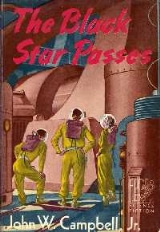
The Black Star Passes
Encyclopedia
The Black Star Passes is a collection of science fiction
short stories by author John W. Campbell, Jr.. It was first published in 1953
by Fantasy Press
in an edition of 2,951 copies. The book is the first in Campbell's Arcot, Morey and Wade series. The stories originally appeared in the magazines Amazing Stories
and Amazing Stories Quarterly, and were "extensively edited" for book publication, with Campbell's approval, by Lloyd Arthur Eshbach
.
Galaxy
reviewer Groff Conklin
described the stories as "three creaking classics . . . fun to read, [but] rococo antiques [without] believable characters, human relations, even logical plots." Boucher
and McComas
dismissed the book as "a hopelessly outdated set of novelets . . . of concern only to those who wish to observe the awkward larval stage of a major figure in science fiction." P. Schuyler Miller
described the stories as "old-fashioned fun which [Campbell] no longer takes any more seriously than you need to."
Science fiction
Science fiction is a genre of fiction dealing with imaginary but more or less plausible content such as future settings, futuristic science and technology, space travel, aliens, and paranormal abilities...
short stories by author John W. Campbell, Jr.. It was first published in 1953
1953 in literature
The year 1953 in literature involved some significant events and new books.-Events:* January 22 - The Crucible, a drama by Arthur Miller, opens on Broadway....
by Fantasy Press
Fantasy Press
Fantasy Press was an American publishing house specialising in fantasy and science fiction titles. Established in 1946 by Lloyd Arthur Eshbach in Reading, Pennsylvania, it was most notable for publishing the works of authors such as Robert A. Heinlein and E. E. Smith...
in an edition of 2,951 copies. The book is the first in Campbell's Arcot, Morey and Wade series. The stories originally appeared in the magazines Amazing Stories
Amazing Stories
Amazing Stories was an American science fiction magazine launched in April 1926 by Hugo Gernsback's Experimenter Publishing. It was the first magazine devoted solely to science fiction...
and Amazing Stories Quarterly, and were "extensively edited" for book publication, with Campbell's approval, by Lloyd Arthur Eshbach
Lloyd Arthur Eshbach
Lloyd Arthur Eshbach was an American science fiction fan, publisher and writer, secular and religious publisher, and minister....
.
Galaxy
Galaxy Science Fiction
Galaxy Science Fiction was an American digest-size science fiction magazine, published from 1950 to 1980. It was founded by an Italian company, World Editions, which was looking to break in to the American market. World Editions hired as editor H. L...
reviewer Groff Conklin
Groff Conklin
Edward Groff Conklin was a leading science fiction anthologist. He edited 40 anthologies of science fiction, one of mystery stories , wrote books on home improvement and was a freelance writer on scientific subjects as well as a published poet...
described the stories as "three creaking classics . . . fun to read, [but] rococo antiques [without] believable characters, human relations, even logical plots." Boucher
Anthony Boucher
Anthony Boucher was an American science fiction editor and author of mystery novels and short stories. He was particularly influential as an editor. Between 1942 and 1947 he acted as reviewer of mostly mystery fiction for the San Francisco Chronicle...
and McComas
J. Francis McComas
Jesse Francis McComas was an American science fiction editor. McComas wrote several stories on his own in the 1950s using both his own name and the pseudonym Webb Marlowe....
dismissed the book as "a hopelessly outdated set of novelets . . . of concern only to those who wish to observe the awkward larval stage of a major figure in science fiction." P. Schuyler Miller
P. Schuyler Miller
Peter Schuyler Miller was an American science fiction writer and critic.-Life:Miller was raised in New York's Mohawk Valley, which led to a life-long interest in the Iroquois Indians. He pursued this as an amateur archaeologist and a member of the New York State Archaeological Association.He...
described the stories as "old-fashioned fun which [Campbell] no longer takes any more seriously than you need to."

